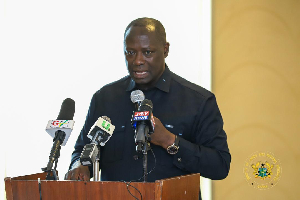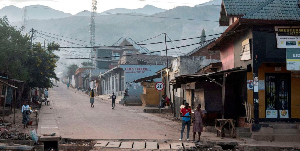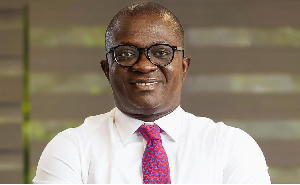The Chairman of the Electoral Commission (EC), Dr. Kwadwo Afari-Gyan, has disclosed that election results will be cancelled if the number of ballot papers in the ballot box is more than voters verified to vote.
He explained that this year’s elections would take another dimension in consolidating the country’s electoral process and ensure there is greater fairness and transparency. He said the verification machines to be used on election day, apart from verifying the identity of voters, would also check rigging by recording the number of people verified at each given time.
As a result, at the end of the day, the number of votes cast should commensurate with the number of voters verified. This means if the number of ballots is more than the voters verified, it is tantamount to inconsistency and rigging; therefore, results from that polling station will be cancelled.
Dr. Afari-Gyan made the disclosure in Ho yesterday when the commission dialogued with parliamentary candidates in the Volta Region. The commission has divided the parliamentary candidates for the impending elections into three, thus the southern, middle and northern belts over a period of three days.
The Volta Regional Director of the EC, Lawrencia Kpatakpa, noted that the event was to deepen the confidence of the candidates, especially those contesting for the first time. It was to also reassure the candidates of the integrity of the commission and give updates on preparation towards the elections.
She also commended the Department for International Development (DFID), UK and Kaff Governance Consult (KGC) for sponsoring the initiative.
Mr Afari-Gyan also emphasized that no verification, no vote, a decision he said was arrived at by the various political parties when the EC met with them. That, he said, also was in line with the law governing this year’s election which said everybody should be biometrically verified before voting.
He explained that although the decision might have dire implications, human and technical, “the political parties say no” and hence the EC would ensure that. He noted that though the EC had made all humanly possible preparations, including the provision of backups, “it is only a fool who can go to sleep and say no machine will break down”.
He added that when such a situation arose, the election would be suspended until the machine was replaced on that same day, noting, “We don’t trust one another and so don’t want to leave the slightest room for discretion.”
Dr. Afari-Gyan noted that the verification machine to be used in December was the first of its kind in the world, adding, “It is specially made for Ghana.” Over 26,000 of such machines have been bought, all of which use batteries.
The machines, he said, had been programmed to possess the list of the persons at a particular polling station, with the backups possessing those in a particular constituency to enable easy replacement in case of a break-down or malfunctioning.
Dr. Afari-Gyan also lamented about the number of minors in the voters register, saying the EC could not take them out of the register and stop them from voting, except the court. That, he said, was because they had gone through the statutory process. He therefore pleaded with parents, opinion leaders and other stakeholders to discourage the minors from attempting to vote to prevent any form of confusion.
He added that the situation was not in the interest of Ghana, especially when international organizations would be monitoring the elections. After deliberations and demonstration of how the verification machine works, most of the candidates were convinced that this year’s elections would be transparent.
General News of Tuesday, 20 November 2012
Source: Daily Guide












